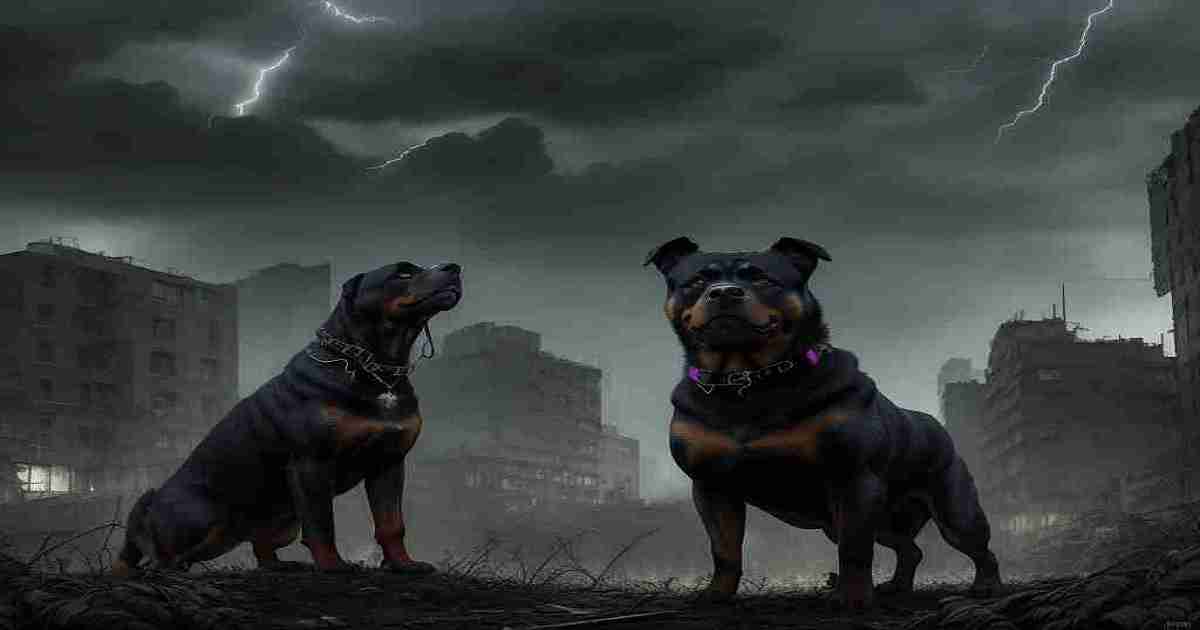Rottweilers are a famous large breed dog known for their loyalty, protective nature, and athleticism.
However, like all purebred dogs, Rottweilers are prone to specific health conditions. Knowing these potential health problems can help you provide the best care for your Rottie and catch any issues early.
Here are 30 of the most common Rottweiler health concerns to be aware of:
Rottweiler Health Issues #1-Hip Dysplasia
Hip dysplasia is an inherited condition where the hip joint develops abnormally, leading to arthritis and lameness. Some signs include:
- Difficulty getting up or lying down
- Reluctance to run, jump, or climb stairs
- Bunny-hopping gait
- Narrow stance or swaying hind end
Rottweilers have a high risk of hip dysplasia due to their large size and rapid growth rate. Have your Rottie screened by age 2 and keep them at a healthy weight to minimize stress on the joints.
Rottweiler Health Issues #2-Elbow Dysplasia
Like hip dysplasia, elbow dysplasia is a common developmental orthopedic disease in Rottweilers. It occurs when the elbow joint grows abnormally, leading to osteoarthritis. Signs include:
- Lameness in the front legs
- Reluctance to place weight on the limbs
- Pain when extending the joint
Several screening tests can identify elbow dysplasia. Managing weight, exercise, and arthritis pain can help afflicted dogs.
Rottweiler Health Issues #3-Osteochondritis Dissecans (OCD)
OCD is caused by improper cartilage growth in the joints, most often in the shoulders. It results in loose cartilage fragments within the joint, causing inflammation and arthritis. Symptoms include:
- Swelling
- Stiffness
- Lameness
OCD often appears between 4-9 months old. Surgery may be needed to remove loose cartilage.
Rottweiler Health Issues #4-Heart Murmurs
Heart murmurs are abnormal heart sounds caused by turbulent blood flow. In Rottweilers, murmurs may indicate:
- Congenital heart defects present at birth
- Valve disorders like pulmonic stenosis
- Dilated cardiomyopathy
Serious murmurs may lead to congestive heart failure. Have murmurs been evaluated by a veterinary cardiologist?
Rottweiler Health Issues #5-Aortic Stenosis
Aortic stenosis is a congenital heart defect involving a narrowed aortic valve. Signs include:
- Fainting or weakness after exercise
- Shortness of breath
- Heart murmur
Aortic stenosis is rare in Rottweilers but can be severe. Mild cases may not need treatment, but severe stenosis requires medication or surgery.
Rottweiler Health Issues #6-Dilated Cardiomyopathy
Dilated cardiomyopathy (DCM) is a heart muscle disease where the heart chambers stretch and thin out, impairing function. Symptoms include:
- Lethargy
- Coughing
- Fainting
- Hind limb weakness
DCM is common in large breeds like Rottweilers. Medications can help manage it, but there is no cure.
Rottweiler Health Issues #7-Hypothyroidism
With hypothyroidism, the thyroid gland doesn’t produce enough thyroid hormone, slowing the body’s metabolism. Signs include:
- Weight gain
- Lethargy
- Skin problems
- Coat changes
Hypothyroidism usually develops in middle-aged Rottweilers. Daily thyroid medication can effectively manage it.
Rottweiler Health Issues #8-Progressive Retinal Atrophy (PRA)
PRA is an inherited eye disease that causes vision loss and blindness due to gradual retinal degeneration. Night blindness is usually the first sign.
Unfortunately, there is no treatment for PRA. Dogs adjust well to vision loss but should be kept from hazards.
Rottweiler Health Issues #9-Cataracts
Cataracts involve opacity in the eye lens, leading to blurred vision and eventual blindness if untreated. Signs include:
- Cloudiness in the eye
- Bumping into objects
- Reluctance to move around
Cataracts requiring surgery are uncommon in Rottweilers. However, dogs with diabetes are prone to developing cataracts.
Rottweiler Health Issues #10-Entropion
Entropion is an inward rolling of the eyelid, causing the eyelashes to rub against the eyeball. This is irritating and can cause corneal ulcers. Signs include:
- Squinting
- Redness
- Eye discharge
Entropion usually appears between 3-6 months old. Veterinary surgery can correct it by removing a section of eyelid skin.
Rottweiler Health Issues #11-Ectropion
Ectropion is the opposite of entropion – the lower eyelid droops outward, exposing the eye to air and irritants. Signs include:
- Redness
- Eye discharge
- Corneal ulcers
Surgical correction may be needed in severe cases. Artificial tears can also help manage ectropion.
Rottweiler Health Issues #12-Cherry Eye
Cherry eye occurs when the gland of the third eyelid prolapses and bulges out as a red mass. Signs include:
- Painful, swollen red mass in the corner of the eye
If untreated, it can result in dry eye syndrome. Cherry eye is common in young Rottweilers. Veterinary surgery can reposition the gland.
Rottweiler Health Issues #13-Canine Parvovirus
Canine parvovirus is a highly contagious viral infection that causes severe vomiting and diarrhea in puppies and unvaccinated dogs. Signs include:
- Vomiting
- Bloody diarrhea
- Fever
- Lethargy
- Loss of appetite
Parvo has a high risk of fatal dehydration. However, intensive vet treatment can save most affected puppies. Strict vaccination prevents parvo.
Rottweiler Health Issues #14-Canine Distemper
Canine distemper is a highly contagious and life-threatening viral disease attacking the respiratory, GI, and nervous systems. Symptoms include:
- Fever
- Pneumonia
- Vomiting, diarrhea
- Seizures
- Muscle twitches
- Paralysis
Distemper is often fatal if untreated. But recovery is possible with good nursing care and medications. Vaccination provides protection.
Rottweiler Health Issues #15-Canine Brucellosis
Brucellosis is a bacterial disease spread through breeding and contact with infected birthing fluids and tissues. Symptoms are variable but may include:
- Abortions in pregnant dogs
- Infertility in males
- Lethargy
- Loss of appetite
- Swollen lymph nodes
Brucellosis is challenging to diagnose and treat. Infected dogs should be spayed/neutered. Vaccination helps prevent the spread.
Rottweiler Health Issues #16-Bloat
Bloat or gastric dilatation-volvulus (GDV) is a life-threatening condition where the stomach twists and fills with gas, trapping air, food, and water. Signs include:
- Retching but not vomiting
- Restlessness
- Abdominal swelling
- Collapse
Bloat requires emergency surgery. Susceptible dogs should be fed small meals, prevent vigorous exercise after eating, and have their stomach tacked preventatively.
Rottweiler Health Issues #17-Hemolytic Anemia
Hemolytic anemia destroys red blood cells faster than the body can replace them, causing anemia. Causes include:
- Immune-mediated disease
- Blood parasites
- Toxins or medications
- Cancer
Symptoms are lethargy, pale gums, dark urine, and loss of appetite. Transfusions, immunosuppressants, or addressing the underlying cause can treat it.
Rottweiler Health Issues #18-Von Willebrand Disease
Von Willebrand disease (vWD) is a common inherited bleeding disorder where blood doesn’t clot properly. Signs include:
- Nosebleeds
- Bleeding gums
- Prolonged bleeding from wounds or surgery sites
Diagnostic tests can identify vWD. Treatment may include transfusions before surgery. Most cases are mild and don’t require transfusions.
Rottweiler Health Issues #19-Allergies
Allergies to food or environmental factors like pollen are common in Rottweilers. Symptoms may include:
- Itchy skin
- Chronic ear infections
- Hair loss
- Hot spots
- Facial rubbing
Allergy testing can identify triggers. Treatment typically involves medications, immunotherapy, or dietary management.
Rottweiler Health Issues #20-Obesity
Over half of U.S. Rottweilers are estimated to be overweight or obese. Obesity predisposes dogs to arthritis, breathing difficulties, diabetes, and cancer.
Prevent obesity by measuring your dog’s body condition regularly, eating a healthy diet, and exercising daily. Weight loss programs can help overweight dogs slim down.
Rottweiler Health Issues #21-Panosteitis
Panosteitis causes sudden limb pain and lameness in young, rapidly growing dogs like Rottweilers. It occurs when bone growth outpaces blood supply, resulting in bone inflammation.
Rest, pain medication, and diet adjustments help manage it. Most dogs outgrow panosteitis by age 2 without long-term issues.
Rottweiler Health Issues #22-Cruciate Ligament Tears
The cruciate ligaments stabilize the knee joint. Cruciate tears are a common injury caused by trauma or gradual wear and tear. Symptoms include:
- Sudden lameness
- Stiffness
- Swelling
- Pain
Surgery, rehabilitation exercises, and sometimes knee braces are needed to treat torn cruciate ligaments.
Rottweiler Health Issues #23-Patellar Luxation
Patellar luxation occurs when the kneecap pops out of place, causing temporary lameness. Mild cases cause occasional “skippy” gaits. Severe cases require surgery to realign the kneecap.
Luxating patellas are often present at birth. Keeping trim weight minimizes joint stress.
Rottweiler Health Issues #24-Osteosarcoma
Osteosarcoma is an aggressive bone cancer most commonly affecting the limbs of large/giant breed dogs. Signs include:
- Lameness
- Swelling over the bone
- Pain
Unfortunately, osteosarcoma spreads rapidly, and survival time is short, even with amputation and chemotherapy.
Rottweiler Health Issues #25-Mast Cell Tumors
Mast cell tumors are a type of skin cancer composed of mast cells. Warning signs include:
- Raised lumps on the skin
- Redness
- Itchiness
- Ulcers
Mast cell tumors range from benign to very malignant. Treatment depends on tumor grade and includes surgery, radiation, and chemotherapy.
Rottweiler Health Issues #26-Demodectic Mange
Demodectic mange mites are average skin residents that only cause issues for dogs with weakened immune systems. Symptoms include:
- Hair loss
- Redness
- Itching
- Scaly skin
Mild cases often resolve on their own as the immune system strengthens. Topical treatments can eliminate mites in problematic issues.
Rottweiler Health Issues #27-Ehrlichiosis
Ehrlichiosis is a tick-borne bacterial disease that attacks white blood cells and causes inflammation. Signs include:
- Fever
- Lethargy
- Loss of appetite
- Painful joints and muscles
- Nosebleeds
Antibiotics like doxycycline effectively treat ehrlichiosis. Promptly removing ticks helps prevent infection.
Rottweiler Health Issues #28-Intervertebral Disc Disease
IVDD occurs when the discs between the vertebrae bulge or rupture, compressing the spinal cord. Symptoms include:
- Unwillingness to jump up
- Crying out in pain
- Paralysis
Mild cases recover with rest and medication. Severe cases require emergency surgery to decompress the spinal cord.
Rottweiler Health Issues #29-Anal Sac Impaction
The anal sacs flanking the anus can become impacted and infected. Signs of anal sac impaction include:
- Straining to defecate
- Scooting the rear end along the ground
- Excessive licking of the area
Vets drain impacted anal sacs manually. Keeping stools firm prevents impaction.
Rottweiler Health Concern #30-Dental Issues
Gingivitis and periodontal disease are prevalent problems in dogs caused by tartar buildup. Warning signs include:
- Bad breath
- Red, swollen gums
- Bleeding from the mouth
- Loose teeth
- Tooth loss
Daily tooth brushing prevents dental disease. Professional cleanings treat existing problems.
Tips to help prevent the 30 common health issues in Rottweilers:
- Get dogs tested and screened early for inherited conditions like hip/elbow dysplasia, eye diseases, and heart problems. This allows you to monitor and manage any issues proactively.
- Feed a high-quality diet and avoid overfeeding. Obesity stresses joints and predisposes dogs to many diseases.
- Provide regular exercise but avoid over-exertion at a young age. Low-impact activities are best for growing puppies.
- Vaccinate puppies and adults properly. Core vaccines prevent deadly contagious diseases like parvo, distemper, and rabies.
- Use heartworm, flea, and tick medication prescribed by your vet to protect against parasites.
- Brush teeth daily and provide annual professional dental cleanings to maintain good oral health.
- Have lumps, bumps, or skin issues evaluated promptly to catch any cancers early.
- Practice good hygiene and avoid dog parks or kennels to limit contagious disease exposure.
- Create a safe home environment free of toxins, hazards, and dangers. Supervise outside time.
- Socialize and train dogs to have good manners. Well-adjusted dogs experience less stress.
- Spay/neuter dogs are not intended for responsible breeding. This prevents some cancers and diseases.
- Partner with a vet for routine wellness exams, prompt care when sick, and follow their prevention plan.
- Purchase dogs only from reputable breeders doing OFA health testing. Review health histories.
Prevention is the best medicine for dogs. Following these tips sets up a Rottweiler for a long, healthy, happy life. Partnering with your vet provides the care they need to thrive.
A Lifetime of Love
While this may seem intimidating, most Rottweilers live happy, healthy lives without significant issues. Awareness of potential health problems allows you to provide the best preventive care and catch problems early. Partnering with a veterinarian, you trust ensures your Rottweiler receives top-notch treatment tailored to their unique needs.
With lots of love, training, socialization, and proper preventive care, your loyal Rottweiler can be your heart dog for life. Working cooperatively with your veterinarian and breeder helps stack the deck in your Rottie’s favor for a long, healthy life together.
Frequently Asked Questions
Q: What health tests should responsible Rottweiler breeders perform?
A: Reputable Rottweiler breeders should test breeding dogs for hip and elbow dysplasia, eye disease, heart disease, and genetic conditions like JLPP. Tests should be conducted by accredited organizations like OFA.
Q: How can I socialize my Rottweiler puppy properly?
A: Socialize your Rottweiler through positive training classes, supervised interactions with vaccinated/friendly dogs, frequent new experiences, and meeting new people. Avoid fearful situations. Go slow and make encounters fun!
Q: What is the life expectancy of a Rottweiler?
A: The average Rottweiler life expectancy is 9-10 years. Larger dogs tend to have shorter lifespans. Providing excellent preventive care and quickly addressing health issues can maximize your dog’s longevity.
Q: Should I spay or neuter my Rottweiler?
A: Most veterinarians recommend spaying or neutering pet Rottweilers not intended for responsible breeding. This helps avoid reproductive cancers and diseases later in life. Talk to your vet about the ideal timing.
Q: How often should my Rottweiler see the vet?
A: Rottweilers should visit the vet annually for a wellness exam. Senior dogs may need biannual exams. Seek prompt vet attention for any signs of illness or injury to keep your dog healthy.
Following the veterinarian’s lead on prevention, early diagnosis, and prompt treatment is critical to having a happy, healthy Rottweiler. With dedicated care, your dog can thrive for years to come!












4 thoughts on “30 Common Rottweiler Health Issues and Concerns”